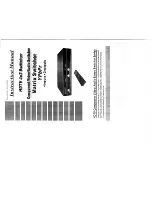
2.
802.1P Priority
Figure 12-2 802.1Q frame
As shown in the figure above, each 802.1Q Tag has a Pri field, comprising 3 bits. The 3-bit
priority field is 802.1p priority in the range of 0 to 7. 802.1P priority determines the priority of
the packets based on the Pri value. On the Web management page of the switch, you can
configure different priority tags mapping to the corresponding priority levels, and then the
switch determine which packet is sent preferentially when forwarding packets. The switch
processes untagged packets based on the default priority mode.
3.
DSCP Priority
Figure 12-3 IP datagram
As shown in the figure above, the ToS (Type of Service) in an IP header contains 8 bits. The first
three bits indicate IP precedence in the range of 0 to 7. RFC2474 re-defines the ToS field in the
IP packet header, which is called the DS field. The first six bits (bit 0-bit 5) of the DS field
indicate DSCP precedence in the range of 0 to 63. The last 2 bits (bit 6 and bit 7) are reserved.
On the Web management page, you can configure different DS field mapping to the
corresponding priority levels. Non-IP datagram with 802.1Q tag are mapped to different priority
levels based on 802.1P priority mode if 8021.1P Priority mode is enabled; the untagged non-IP
datagram are mapped based on port priority mode.
Schedule Mode
When the network is congested, the problem that many packets compete for resources must
be solved, usually in the way of queue scheduling. The switch implements seven scheduling
queues, ranging from TC0 to TC6. TC0 has the lowest priority while TC6 has the highest priority.
The switch supports three schedule modes: SP, WRR and SP+WRR.
1.
SP-Mode: Strict-Priority Mode. In this mode, the queue with higher priority will occupy the
whole bandwidth. Packets in the queue with lower priority are sent only when the queue
with higher priority is empty. The switch has eight egress queues labeled as TC0, TC1,
TC2 …TC6. In SP mode, their priorities increase in order. TC6 has the highest priority. The
disadvantage of SP queue is that: if there are packets in the queues with higher priority for
a long time in congestion, the packets in the queues with lower priority will be “starved to
death” because they are not served.
296
















































